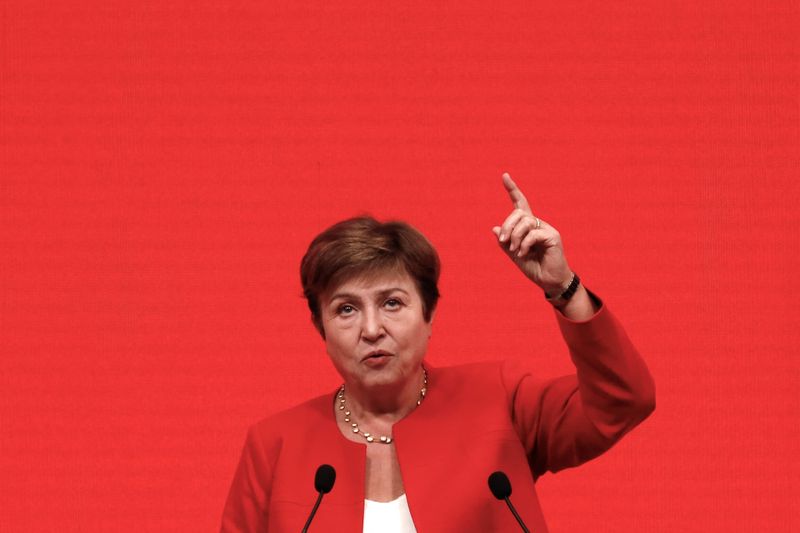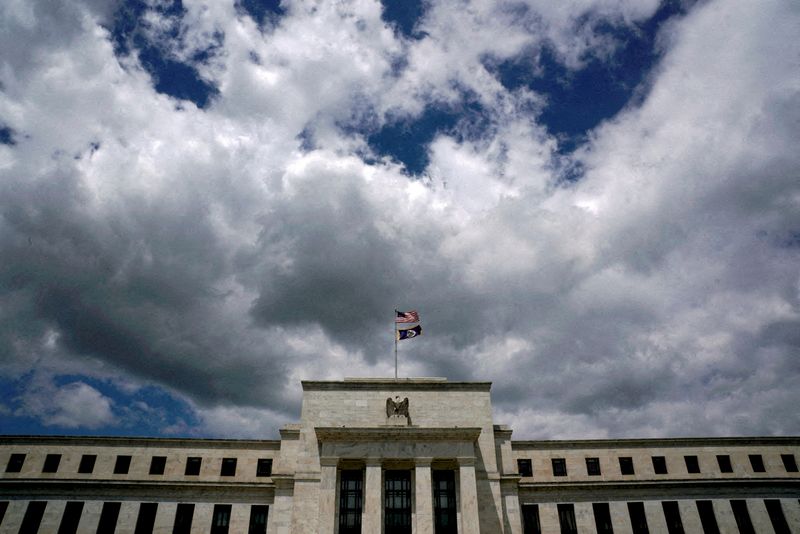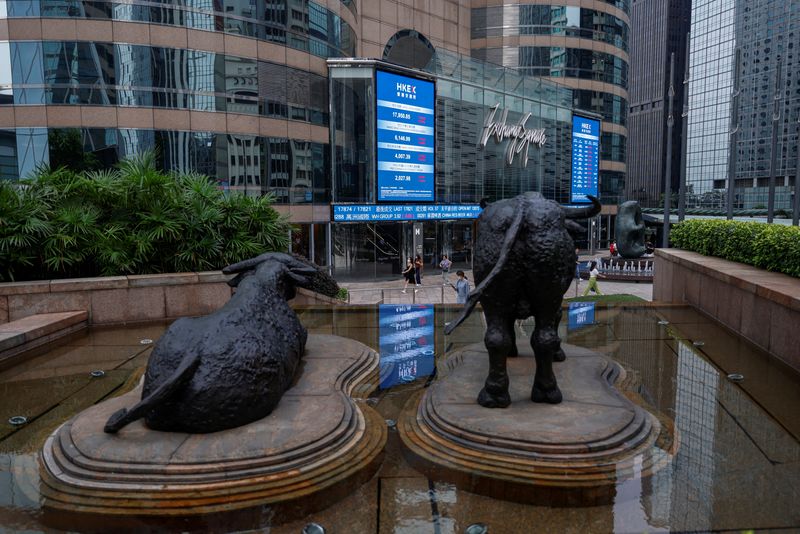Select Language

By Maria Martinez
BERLIN (Reuters) - German inflation eased in March, helped by a drop in energy and food prices, final data from the federal statistics office showed on Friday.
Inflation in Europe's largest economy slackened in March to 2.3%, its lowest level since June 2021. German consumer prices, harmonised to compare with other European Union countries, had risen by 2.7% year-on-year in February.
Core inflation in Germany, which excludes volatile food and energy prices, was at 3.3% in March, down from 3.4% in February.
Underlying inflation is closely watched by the European Central Bank to gauge the durability of price pressures.

By Andrea Shalal
WASHINGTON (Reuters) - IMF chief Kristalina Georgieva on Thursday said higher U.S. interest rates were not great news for the rest of the world and could become a worry if they continued for a long time, but she thought the U.S. Federal Reserve was acting prudently.
Georgieva, speaking at an event hosted by the Atlantic Council, said the U.S. government could also look at taking other measures to ensure that the U.S. economy was not overheating, but gave no details.
"Higher interest rates for the rest of the world is not great news. Higher interest rates make the U.S. more attractive so financial flows come here and that leaves the rest of the world somewhat struggling," she said.
Higher rates also drove the value of the dollar higher, which meant other countries' currencies were weaker.
"If it continues for a long time, it could become a bit of a worry in terms of financial stability," she said.
Consumer level inflation data for March released on Wednesday was unexpectedly strong, casting further doubt on the Fed’s current forecast of rate cuts at some point later this year.
The unfavorable price pressure data comes as other reports also pointed to sturdier inflation over the start of the year, challenging the Fed’s most recent projections that penciled in three rate cuts this year.
Minutes from the U.S. Federal Reserve showed officials worried that progress on inflation may have stalled, and a longer period of tight monetary policy would be needed to tame it in the world's largest economy.
Investors who had earlier expected a rate cut in June now see September as a likelier timing for the easing cycle to begin, following a third consecutive stronger-than-forecast reading on consumer inflation.
Georgieva said the U.S. economy had been successful because it was more innovative, opening space for entrepreneurship at a time of accelerating technological change.
The U.S. labor market had also held up well, with labor supply boosted by immigration, which in turn helped keep wage growth under control, she said.
The Biden administration's Inflation Reduction Act and earlier COVID aid had helped support growth, she said, adding that the International Monetary Fund saw some scope for the U.S. government to address lingering inflation and work toward a soft landing for the economy.
"So fasten your belts," she said. "At some point we will be landing."

By Kevin Yao
BEIJING (Reuters) - China's economy likely grew 4.6% in the first quarter from a year earlier - the slowest in a year despite tentative signs of steadying, a Reuters poll showed on Thursday, maintaining pressure on policymakers to unveil more stimulus measures.
Gross domestic product (GDP) in the world's second-biggest economy is also expected to grow at a subdued 4.6% pace in 2024 year-on-year, according to the median forecast of 86 economists polled by Reuters, falling short of the official target of around 5.0%.
Analysts are forecasting an even slower rate of growth for 2025 of 4.4%
The first-quarter growth forecast compares to 5.2% in the previous three months and is the lowest since the January-March quarter in 2023, underlining the strains in the economy despite stronger than expected January-February data on factory output and retail sales, as well as exports.
Analysts expected growth to pick up to 5.0% in the second quarter, but policymakers have their work cut out in trying to shore up confidence and demand.
China's economy has struggled to mount a strong and sustainable a post-COVID bounce, burdened by a protracted property downturn, mounting local government debts and weak private-sector spending.
The government has unveiled fiscal and monetary policy measures in a bid to achieve what analysts have described as an ambitious 2024 GDP growth target, noting that last year's growth rate of 5.2% was likely flattered by a comparison with a COVID-hit 2022.
"The economy has yet to recover," Ting Lu, chief China economist at Nomura, said in a note. "The property sector is still on the decline, the risk of another fiscal cliff is on the rise, geopolitical challenges are likely to sustain, and growth might face downward pressure again over the next few months."
Fitch cut its outlook on China's sovereign credit rating to negative on Wednesday, citing risks to public finances as Beijing channels more spending towards infrastructure and high-tech manufacturing, amid a shift away from the property sector.
China's consumer inflation cooled more than expected in March, while producer price deflation persisted, suggesting policymakers may need to launch more stimulus to spur demand.
On a quarterly basis, the economy is forecast to expand 1.4% in the first quarter, quickening from 1.0% in October-December, the poll showed.
The government is due to release first quarter GDP data, along with March activity data, at 0200 GMT on April 16.
MORE POLICY SUPPORT NEEDED
The Asian Development Bank (ADB) on Thursday raised its forecast on China's 2024 economic growth to 4.8% from 4.5% previously, citing stronger household consumption.
"Effective measures to resolve property sector problems and strengthen private investment and household consumption should be enhanced this year to support growth momentum," the bank said.
The People's Bank of China (PBOC) has pledged to step up policy support for the economy this year and promote a rebound in prices.
Analysts polled by Reuters expected the central bank to cut the banks' reserve requirement ratios (RRR) by 25 basis points (bps) in the third quarter, following a 50-basis point cut earlier this year, which was the biggest in two years.
Xuan Changneng, a deputy governor of the PBOC, said in late March that there was still room for cutting RRR.
Consumer inflation will likely pick up to 0.7% in 2024 from 0.2% in 2023 - well below the government's target of around 3%, and rise further to 1.6% in 2025, the poll showed.
Some analysts believe the central bank faces a challenge as more credit is flowing to production than into consumption, exposing structural flaws in the economy and reducing the effectiveness of its monetary policy tools.
(For other stories from the Reuters global long-term economic outlook polls package:)
(Polling by Devayani Sathyan, Anant Chandak and Milounee Purohit; Reporting by Kevin Yao; Editing by Shri Navaratnam)

By Michael S. Derby
NEW YORK (Reuters) -The Federal Reserve is preparing in short order to slow the rate at which it sheds Treasury securities from its balance sheet, with policymakers generally favoring cutting the recent pace by roughly half in an effort to extend the process of shrinking holdings and reducing the risk of market trouble.
According to minutes released on Wednesday of the Fed's latest policy meeting, held on March 19-20, officials are thinking about the future of their balance sheet winddown, known as quantitative tightening, or QT, with an eye toward the 2017 to 2019 period, when they last engaged in a similar process that ended up with significant market tumult.
Due to that experience, officials last month “broadly assessed it would be appropriate to take a cautious approach," and "the vast majority of participants thus judged it would be prudent to begin slowing the pace of runoff fairly soon.”
The Fed is currently allowing up to $60 billion per month in Treasury bonds and up to $35 billion per month in mortgage bonds to mature and not be replaced as part of the QT agenda.
“Participants generally favored reducing the monthly pace of runoff by roughly half from the recent overall pace,” the minutes said, and officials aim to do this by tweaking the runoff of Treasuries and leaving in place the cap on mortgage bond runoff. For a variety of reasons, the Fed has struggled to see mortgages run off at the desired pace. And as it ultimately wants as close to an all-Treasuries securities portfolio as it can get, it's government securities that will see the biggest effect in the looming taper.
By slowing the pace of the contraction, the minutes said officials believe they may gain some flexibility in how far they can reduce overall holdings, with the minutes noting "the decision to slow the pace of runoff does not mean that the balance sheet will ultimately shrink by less than it would otherwise."
Capital Economics economists said in a note that against the $95 billion monthly cap over the last 12 months the central bank had averaged a $76 billion per month drawdown, with the shortfall tied to mortgages. Based on the guidance in the minutes, "officials appear to be considering cutting the Treasury-specific run-off to $30 billion per month," and given current levels of banking sector reserves, a reduced-speed QT will likely run for another year, the research firm said.
As for when the Fed will shift gears, J.P. Morgan economist Michael Feroli said “we continue to believe that the committee will announce a halving of the Treasury cap at the next FOMC meeting in early May, with implementation occurring in mid-May.”
RUNOFF REVISIONS
Fed officials had to a large degree already hinted at the planning effort revealed in the meeting minutes. The current QT process has sought to unwind a massive expansion in Fed holdings that kicked off with the arrival of the coronavirus pandemic.
Starting in the spring of 2020, the Fed aggressively bought Treasury and mortgage securities, first to steady troubled markets and then to provide stimulus when the federal funds rate was at near zero levels and could be cut no further.
The purchases caused the size of Fed holdings to more the double, with the balance sheet moving from $4.4 trillion in March 2020 to $9 trillion by the summer of 2022. Later that year, the Fed embarked on its QT effort which has allowed the Fed to shed about $1.5 trillion from its holdings.
The Fed’s goal for the drawdown is to drain liquidity from the financial system, moving from what it views as abundant reserves to ample ones. Fed officials have been unable to define what level “ample” will be but believe it leaves enough liquidity in the financial system to allow for normal volatility in money market rates and firm central bank control over the federal funds rate.
Ahead of the Fed meeting, officials had been hinting at what is to come, and what the slowdown in the runoff might accomplish.
“A slower but still meaningful pace will provide more time for banks and money market participants to redistribute liquidity and for the FOMC to assess liquidity conditions,” Dallas Fed President Lorie Logan said on April 4. Before taking the leadership spot at the Dallas Fed, Logan ran the process of implementing monetary policy at the New York Fed.
Speaking after the FOMC meeting last month Fed Chair Jerome Powell said officials are taking the debate in discrete steps. For now, “what we’re really looking at is slowing the pace of runoff,” Powell said on March 20. “we’re not discussing all the many other balance sheet issues. We will discuss those in due course,” he said.

By Satoshi Sugiyama and Yoshifumi Takemoto
TOKYO (Reuters) -Japanese Finance Minister Shunichi Suzuki said on Thursday that authorities would not rule out any steps to deal with excessive exchange-rate swings after the dollar surged to a 34-year high against the yen.
"We are not just looking at (dollar/yen) levels themselves such as 152 yen or 153 yen (per dollar) but also analysing their background," Suzuki told reporters. "We are looking with a high sense of urgency," he added.
Suzuki also said excessive currency moves are not desirable and that it was important for currencies to move in a stable manner reflecting fundamentals.
Speaking in parliament, Suzuki later said while the weak yen had both merits and demerits, he was always concerned about its impact on prices.
His comments came after the yen weakened past 153 per dollar, the lowest since 1990, following Wednesday's release of strong U.S. inflation data. The dollar stood at 152.90 yen in Asia on Thursday.
Market participants have been on alert for any signs of yen intervention from Japanese authorities.
Japan last intervened in the currency market in 2022, first in September and again in October, to prop up the yen.
Earlier in the day, Japan's top currency diplomat Masato Kanda said recent yen moves were rapid and that he would not rule out any steps.
But Suzuki and Kanda both declined to say whether the yen's overnight falls were deemed excessive and did not escalate his warning to take "decisive action" against sharp yen declines.
"I don't have any particular (dollar/yen) level in mind but excessive volatility has a negative impact on the economy," Kanda, who is vice finance minister for international affairs, told reporters.
"Recent moves are rapid. We'd like to respond appropriately to excessive moves, without ruling out any options," he said.
"We are always prepared to respond to any situation," Kanda said when asked whether authorities were preparing to intervene in the currency market to prop up the yen.
"Compared with 2022 when Japan intervened to stem a weak yen that broke past 145 to the dollar, Japanese authorities seem to lack determination to defend the yen this time around," Masafumi Yamamoto, chief FX strategist at Mizuho Securities, said.
"Given that the dollar's strength reflects a solid U.S. economy and interest rate differentials between Japan and the United States are wide open, Japanese authorities may feel it would be useless even if they intervene now."

By Balazs Koranyi and Francesco Canepa
FRANKFURT (Reuters) - The European Central Bank is all but certain to keep borrowing costs at a record high on Thursday but is likely to signal that a rate cut could come as soon as June, given a sharp slowdown in inflation and continued economic weakness.
The ECB has kept interest rates steady since September but has already signalled that cuts are coming into view, with policymakers awaiting a few more comforting wage indicators before pulling the trigger.
The only complication could be if the U.S. Federal Reserve delayed its own policy easing, although even that might slow but not stop the ECB given a widening gap in performance of the world's biggest economy and the 20-country euro zone.
The currency bloc is now in its sixth straight quarter of economic stagnation and the labour market is starting to soften. Meanwhile, the U.S. economy continues to grow above trend, its labour market remains tight and inflation rose more than expected last month, raising the risk of price growth getting stuck.
"June feels like a compromise between (ECB) doves and hawks," Deutsche Bank said in a note.
"The hawks accept that the inflation outlook has improved but don't want to rush into easing as soon as April. The doves may be pleased the hawks are not opposing cuts and are happy to wait until June for a stronger consensus on a cut."
Policymakers have pointed to a June cut in the 4% deposit rate so often that investors consider it an effective pre-commitment and any walking back would risk damaging the ECB's credibility.
But ECB President Christine Lagarde is likely to avoid any talk of what happens beyond June, especially as there is little consensus yet on how far and fast interest rates need to fall.
Markets have priced in 80 basis points of cuts this year, or between three and four moves, but these expectations have moved in a wide range.
FED IN SIGHT
Fuelling rate-cut talk, consumer price inflation fell to 2.4% last month and could ease back to the ECB's 2% target before year-end, well ahead of the bank's own 2025 projection.
Meanwhile rapid wage growth, seen by the ECB as the single biggest inflation threat, is slowing, labour markets are softening, investment is weak and bank lending stagnant, all pointing to a further decline in price pressures.
"We think the ECB might stop slightly above neutral and we are forecasting a 2.25%-2.50% terminal rate," Antonio Villarroya at Santander (BME:SAN) CIB said.
"As a result, the ECB would need to cut 150-175bp in slightly over three quarters. Therefore, the room for skipping/pausing looks very limited and we think a 25bp cut/meeting is the most likely scenario."
Most others, however, see slower moves, with the ECB skipping a meeting or two - possibly July or October, when it does not publish new inflation and growth projections.
The Fed could also disrupt the ECB's plans.
While the U.S. central bank is still keeping three rate cuts on the table for this year, markets are increasingly doubtful given the remarkable strength of the American economy and upside surprises in inflation. Cuts too close to November's U.S. elections might also risk fuelling accusations of political interference.
The ECB insists that it sets policy independently, but prolonged divergence with the Fed, which traditionally sets the pace for the global economy, could be counterproductive.
Faster ECB rate cuts would weaken the euro and push up yields as funds flow across the Atlantic, so markets would simply undo some of the ECB's work.
A June rate cut would pre-empt the Fed in any case but the ECB will be careful not to get too far ahead.
"Imagining policies diverging for longer is more difficult, because ultimately whatever drives decisions at the Fed will spill over to Europe and affect the euro zone as well," Danske Bank economist Piet Haines Christiansen said.

MANILA (Reuters) - Developing Asia's growth this year is expected to be slightly stronger than previously forecast as healthy domestic demand in many economies offsets the property-driven slowdown in China, the Asian Development Bank (ADB) said on Thursday.
The ADB nudged up its 2024 growth forecast for Developing Asia to 4.9% from 4.8% projected in December, but warned of persistent challenges such as rising geopolitical tensions, including in the Middle East, that could disrupt supply chains and reignite inflation.
The Manila-based lender's 2024 growth forecast was slightly weaker than the region's 5.0% growth in 2023. Growth for 2025 was also forecast at 4.9%.
"Growth in developing Asia will remain robust this year, in spite of uncertainty in the external environment," ADB Chief Economist Albert Park said in the Asian Development Outlook report.
"The end of interest-rate hiking cycles in most economies as well as continued recovery in goods exports from an upturn in the semiconductor cycle will support growth," Park said.
China remains a weight on the regional growth outlook as a protracted property crisis and other challenges keep the world's No.2 economy from mounting a strong economic revival, the ADB said.
ADB Principal Economist John Beirne, in a briefing ahead of the report's release, said Wednesday's cut by Fitch of its outlook on China's sovereign credit rating to negative was concerning for investor sentiment.
"It can have additional problems that are already apparent in the property sector, and certainly it's not helpful when we consider local government debts and sustainability of debt and cost of sovereign borrowing," Beirne said.
The ADB forecast China would grow 4.8% in 2024. That is higher than its 4.5% estimate made in December, but slower than growth of 5.2% in 2023.
It expects the Chinese economy to lose more steam next year, with growth seen slowing to 4.5%, "driven by the weak property market and amplified by fading domestic consumption growth after last year's reopening", the ADB said.
The ADB forecast regional inflation would slow to 3.2% in 2024 from 3.3% in 2023, and ease further to 3.0% in 2025.
GDP GROWTH 2022 2023 2024 2024 2024 2025
SEPT DEC APR APR
Caucasus and 5.2 5.3 4.7 4.6 4.3 5.0
Central Asia
East Asia 2.9 4.7 4.2 4.2 4.5 4.2
China 3.0 5.2 4.5 4.5 4.8 4.5
South Asia 6.6 6.4 6.0 6.0 6.3 6.6
India 7.0 7.6 6.7 6.7 7.0 7.2
Southeast 5.7 4.1 4.8 4.7 4.6 4.7
Asia
Indonesia 5.3 5.0 5.0 5.0 5.0 5.0
Malaysia 8.7 3.7 4.9 4.6 4.5 4.6
Myanmar 2.4 0.8 3.2 n/a 1.2 2.2
Philippines 7.6 5.6 6.2 6.2 6.0 6.2
Singapore 3.8 1.1 2.5 2.5 2.4 2.6
Thailand 2.5 1.9 3.7 3.3 2.6 3.0
Vietnam 8.0 5.0 6.0 6.0 6.0 6.2
The Pacific 7.9 3.5 2.9 2.9 3.3 4.0
Developing 4.3 5.0 4.8 4.8 4.9 4.9
Asia
INFLATION
Caucasus and 12.9 10.5 8.0 8.4 7.9 7.0
Central Asia
East Asia 2.3 0.6 2.1 2.1 1.3 1.6
China 2.0 0.2 2.0 2.0 1.1 1.5
South Asia 8.0 8.4 6.6 6.7 7.0 5.8
India 6.7 5.5 4.2 4.2 4.6 4.5
Southeast 5.3 4.1 3.3 3.5 3.2 3.0
Asia
Indonesia 4.1 3.7 3.0 3.0 2.8 2.8
Malaysia 3.4 2.5 2.7 2.7 2.6 2.6
Myanmar 27.2 22.0 8.2 n/a 15.5 10.2
Philippines 5.8 6.0 4.0 4.0 3.8 3.4
Singapore 6.1 4.8 3.0 3.0 3.0 2.2
Thailand 6.1 1.2 2.3 2.3 1.0 1.5
Vietnam 3.2 3.3 4.0 4.0 4.0 4.0
The Pacific 5.2 3.0 4.5 4.5 4.3 4.1
Developing 4.4 3.3 3.5 3.6 3.2 3.0
Asia

SYDNEY (Reuters) - Australian business conditions were little changed in March as sales and employment held steady in the face of decade-high interest rates, a survey showed on Tuesday, while price pressures eased slightly from elevated levels.
The survey from the National Australia Bank (OTC:NABZY) (NAB) showed its index of business conditions dipped 1 point to +9, continuing its trend of above-average activity for much of the past year.
Its volatile measure of business confidence rose 1 point to +1.
The survey's measure of business sales held steady at +14 and employment remained unchanged at +6, although profitability fell 4 points to +6.
Capacity utilisation dipped to 83.2%, from 83.4%, suggesting supply and demand are coming into better balance, albeit at an incremental pace.
"Fundamentally, it tells us that firms have continued to be a bit concerned about the outlook even as the economy has remained resilient," said NAB's chief economist Alan Oster, adding that there was some positive news in the retail and construction sectors for the month.
Quarterly growth in retail prices eased to a still elevated 1.3%, after jumping to 1.4% in February in a possible red-flag on the persistence of inflation pressures. Growth in purchase costs fell to 1.4% from 1.8%.
"This aligns with our expectation that progress on bringing inflation back to target will be gradual from here, and we expect that to be further reinforced by the Q1 CPI result later in April," said Oster.
The Reserve Bank of Australia (RBA) left interest rates unchanged at 4.35% last month and softened its stance by dropping a tightening bias. However, it did not rule anything in or out on policy.
Markets are wagering that rates have peaked but any relief won't come until around November.

By Patricia Zengerle
WASHINGTON (Reuters) - Former U.S. President Donald Trump's secretary of state, Mike Pompeo, added his voice on Monday to growing calls from prominent Republicans to pass billions of dollars in aid for Ukraine, after some party members accused aid opponents of succumbing to Russian propaganda.
Democratic President Joe Biden's request for $95 billion for Ukraine, Israel and other allies passed the U.S. Senate with 70% support but has been stalled for weeks in the House of Representatives as Republican House Speaker Mike Johnson has refused to allow a vote.
As lawmakers returned to Washington from a two-week break on Monday, Johnson gave no word of any plans for a vote on Biden's supplemental request.
Pompeo, a former House member, issued a public letter on Monday urging Johnson to bring up the bill in the House.
"We encourage you to lead with conviction and bring the aid package to a vote," Pompeo said in a letter written with John Walter, president of the Hudson (NYSE:HUD) Institute, where Pompeo is a fellow.
Johnson's office did not comment on the letter, or recent assertions by the Republican chairpersons of two House national security committees that "Russian propaganda" is influencing party members.
Representative Michael McCaul, who leads the House Foreign Affairs Committee, told Puck News last week: "Russian propaganda has made its way into the United States, unfortunately, and it’s infected a good chunk of my party’s base."
And on Sunday, Representative Mike Turner, who heads the House Intelligence Committee, told CNN's "State of the Union" McCaul's contention was "absolutely true."
Turner said: "We see directly coming from Russia attempts to mask communications that are anti-Ukraine and pro-Russia messages, some of which we even hear being uttered on the House floor."
For example, Turner said some members of Congress "incorrectly" say that the conflict between Russia and Ukraine is over NATO.
"To the extent that this propaganda takes hold, it makes it more difficult for us to really see this as an authoritarian versus democracy battle," Turner said.

By Tom Westbrook
SINGAPORE (Reuters) - Industrial metals prices extended their gains on Tuesday with expectations of a worldwide manufacturing rebound, while Asian shares crept up a little more cautiously ahead of this week's U.S. inflation data and a crucial European Central Bank meeting.
MSCI's broadest index of Asia-Pacific shares outside Japan rose 0.2%. Japan's Nikkei rose 0.6%.
Shanghai copper futures were up 1% at a two-year high and have gained more than 10% in a month. Zinc made a five-month high in Shanghai, where Aluminium made a 22-month peak on Monday. [MET/L]
Even iron ore, battered by China's property downturn, steadied above $100 a tonne in Singapore. [IRONORE/]
"It's pretty much a China bet," said Vishnu Varathan, head of economics at Mizuho Bank in Singapore.
"It's coincided with a global manufacturing bottoming, and I think that plays well into China's industrial recovery. That aspect of it is a broader-based story for metals."
On Monday, data showed German industrial production rising more than expected in February.
Last week, data showed U.S. manufacturing growing for the first time in one-and-a-half years. China's manufacturing activity expanded for the first time in six months in March.
Precious metals have been soaring, too, with gold hovering just below a record high of $2,353 hit on Monday. Spot gold has risen nearly 14% this year. [GOL/]
Silver hit its highest since mid-2021 on Monday and platinum has also shot higher. Brent crude is below recent peaks but clinging above $90 a barrel at $90.62.
Chinese stocks have not joined the party, though Hong Kong's Hang Seng was 1.2% higher in early trade and China proxies such as the Antipodean currencies have been rallying.
The Australian dollar is up almost 2% in a week and traded at $0.6605 on Tuesday. The New Zealand dollar has regained a footing above $0.60 and hit a two-week high of $0.6047 in morning trade.
China's yuan, down about 1.8% this year, has found a floor around 7.3 to the dollar.
CPI AND ECB AHEAD
For global stock markets, bonds and currencies, the main focus this week is on U.S. inflation data due on Wednesday and the European Central Bank meeting on Thursday.
Expectations for U.S. rate cuts have been evaporating and where in January markets had expected more than 150 basis points in cuts, investors now are not even sure of half that many.
Annualised headline U.S. inflation is seen rising to 3.4% in March from 3.2% a month earlier. U.S. two-year yields, which track short-term interest rate expectations, are their highest since late November at 4.801%, while ten-year yields also hit 2024 highs of 4.46% on Monday.
The dollar has struggled to follow the rates higher, however, with the euro firm in case of a hawkish surprise from the ECB and the commodity currencies rallying.
The euro is at $1.0860.
The ECB is expected to hold interest rates, but flag a cut the markets have priced for June.
"A stabilisation around $1.0800 in the near term remains likely in EUR/USD, although drops to $1.07 or lower look more likely than a break higher to $1.09/1.10," strategists at ING said.
The yen, meanwhile, continues to face heavy pressure as investors see any lags in global rate cuts as leaving the gap open wide with Japan's near-zero interest rates.
At 151.87 per dollar, the yen is a whisker from last month's 34-year low of 151.975. Against the euro, the yen is at its weakest for three weeks at 164.96.
Japanese Finance Minister Shunichi Suzuki said authorities will not rule out any options in dealing with excessive yen moves, repeating his warning that Tokyo is ready to act against the currency's recent sharp declines.
"We expect (Japan) to intervene above 152, but not immediately on a break," Standard Chartered (OTC:SCBFF) strategist Steve Englander said in a note to clients.

